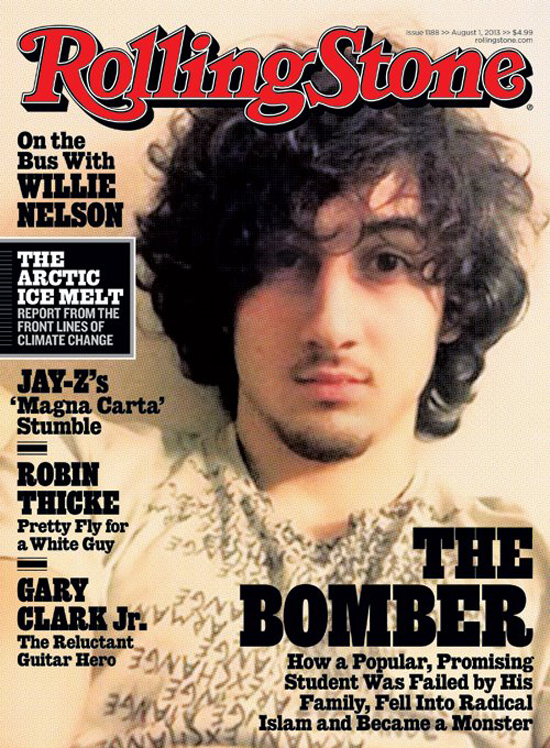Does Rolling Stone's Tsarnaev cover glamorize terrorism?
The magazine's rock-star treatment of the accused Boston Marathon bomber sparks outrage


A free daily email with the biggest news stories of the day – and the best features from TheWeek.com
You are now subscribed
Your newsletter sign-up was successful

Rolling Stone is facing an outburst of criticism over its decision to put surviving Boston Marathon bombing suspect Dzhokhar Tsarnaev on its cover — a spot normally reserved for rock stars and actors. Outraged observers called the image — showing the 19-year-old Tsarnaev with tousled hair and a dreamy gaze, in a picture he once posted online —"disgusting," arguing that it glorified terrorism and insulted the victims of the deadly April attack.
"Boycott Rolling Stone" immediately became a trending topic on Twitter in Boston. Northeastern University criminologist Jack Levin said the cover story was sending terrorist wannabes the message that, "If they want to become famous — kill somebody." Celebrities were among the first to slam the magazine for giving an accused terrorist the rock-star treatment.
The magazine describes the cover article, by contributing editor Janet Reitman, as a "riveting and heartbreaking account of how a charming kid with a bright future became a monster." Reitman, Rolling Stone says, spent two months talking to investigators as well as Tsarnaev's friends, neighbors, and teachers. The story reveals that Tsarnaev downplayed his family troubles and hardline Muslim beliefs, although he once confided to a friend that he felt terrorism could sometimes be justified due to U.S. policies toward Muslim nations.
The Week
Escape your echo chamber. Get the facts behind the news, plus analysis from multiple perspectives.

Sign up for The Week's Free Newsletters
From our morning news briefing to a weekly Good News Newsletter, get the best of The Week delivered directly to your inbox.
From our morning news briefing to a weekly Good News Newsletter, get the best of The Week delivered directly to your inbox.
Rolling Stone's detractors, however, see little purpose in splashing Tsarnaev's glamour shot on the cover — other than to stir up publicity and sell heaps of magazines. Here's Jim Geraghty of National Review:
The article also angered Tsarnaev's fans, who include smitten young admirers who have sent him love notes in jail. Members of the "Free Jahar" movement (Jahar is another spelling of Tsarnaev's first name) tweeted that Rolling Stone was "stirring the pot even more" by calling Tsarnaev a monster even though he has not gone on trial yet.
The magazine is not without its defenders.
That might be Rolling Stone's best defense. As Slade Sohmer notes at Hypervocal, the Times isn't the only publication that has already used the image Rolling Stone put on its cover — it has been "on every news website in the country." Months of incessant coverage has already glamorized Tsarnaev, Sohmer says.
A free daily email with the biggest news stories of the day – and the best features from TheWeek.com
But now that his smug selfie stares at you from the cover of a rock magazine, regardless of the fact that the story itself seems to be good journalism — real journalism telling a story we WANT to hear, we NEED to hear, the 'teachable moment' story of how a normal kid ended up trying to commit mass murder in the name of terrorism — we're outraged?...Rolling Stone's Janet Reitman went deep on this profile, revealing new details that might paint a more helpful picture for us of what a terror suspect might look like. By all accounts, this is something that people are not only interested in, but something by which they're fascinated. Its the big feature this month. What happens when someone's the big feature? They get the cover. How do magazines try to get you to read it? They entice with the cover. That's all that happened here. Next. [Hypervocal]
Harold Maass is a contributing editor at The Week. He has been writing for The Week since the 2001 debut of the U.S. print edition and served as editor of TheWeek.com when it launched in 2008. Harold started his career as a newspaper reporter in South Florida and Haiti. He has previously worked for a variety of news outlets, including The Miami Herald, ABC News and Fox News, and for several years wrote a daily roundup of financial news for The Week and Yahoo Finance.
-
 What are the best investments for beginners?
What are the best investments for beginners?The Explainer Stocks and ETFs and bonds, oh my
-
 What to know before filing your own taxes for the first time
What to know before filing your own taxes for the first timethe explainer Tackle this financial milestone with confidence
-
 The biggest box office flops of the 21st century
The biggest box office flops of the 21st centuryin depth Unnecessary remakes and turgid, expensive CGI-fests highlight this list of these most notorious box-office losers
